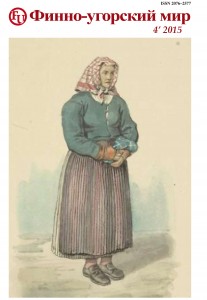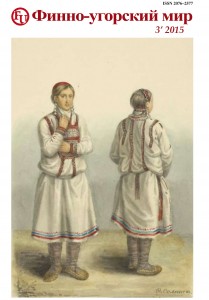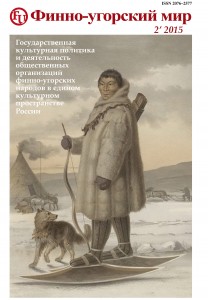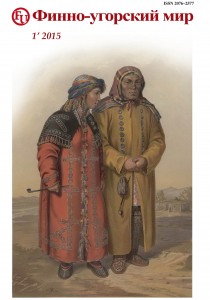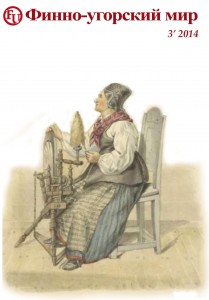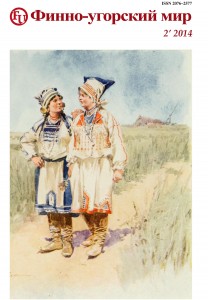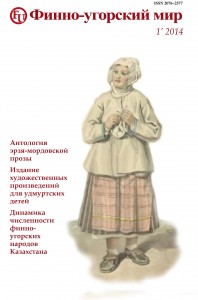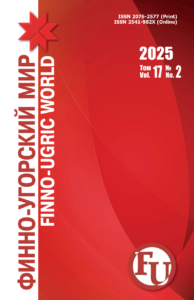PHILOLOGY
V. I. Demin (Saransk, Russia). Laughter of my people. Comic in an oral-poetic creativity of Mordovians
The article identified and analyzed oral forms of folk satire and humor, which played an important role in the formation and development of the Mordovian literary works, growth of education and culture of the nation.
Keywords: comic, comedy, satire, humor, folklore, oral-poetry genre.
G. S. IVANOVA (Saransk, Russia), I. Ja. ZHEBRATKINA (Ryazan, Russia), L. V. ISHAEVA (Saransk, Russia). Distribution of vowels of not-first syllable of the Central dialect of Moksha-Mordovian language
The article considers the distribution of vowels in not-first syllable of the Central dialect of Moksha-Mordovian language. It identifies trans-dialect and cross dialect alternation of vowels.
Keywords: Мoksha language; dialect; vowel; phonetic process; assimilation.
O. A. KOLOKOLOVA (Petrozavodsk, Russia). Christian tradition and folk beliefs in the story by N. M. Yakkola “Watershed”
The article features the phenomenon of folk Christianity and its existence in the Karelian peasant village in pre-revolutionary period. It studies the features of the combination of the Christian tradition with folk beliefs basing on the story by N. M. Yakkola “Watershed”.
Keywords: N. M. Yakkola; story; “Watershed”; a popular Orthodox Christian tradition; folk beliefs.
O. V. KOCHEVATKINA, A. M. KOCHEVATKIN (Saransk, Russia). The Concept of Grammatical Homogeneity and Heterogeneity of Attributes in Mordovian Languages
The article deals with the problem of grammatical homogeneity and heterogeneity of attributes in Mordovian languages; the mentioned questions are quite complicated in the process of studying the syntax of the Mordovian languages.
Keywords: homogeneity; heterogeneity; syntax; intonation; coordinative connection; subordinative connection
V. L. SYAZI (Khanty-Mansiysk, Russia). Lyrical image in the novel by E. D. Aipin “Waiting for the first snow”
The article discusses the lyrical image of the hero, which combines the features of the loving and the beloved hero. The story “Waiting for the first snow,” is one of the few works which combine several love stories.
Keywords: Khanty literature; lyrical image; E. D. Aipin; the story; loving hero.
T. P. ARISKINA (Saransk, Russia). Economic terms in the encyclopedia “Mordoviyas”
The article gives the comprehensive study of the economic terms found in the encyclopedia “Mordoviyas”.
Keywords: term; to coin the term; economic terms; borrowing; methods of word-building; encyclopedia; “Mordoviyas’” / “Mordovia”.
E. G. RAKHIMOVA (Moscow, Russia). Oral correspondences of Kalevala rune about Henrick the Bishop’s Death
The Rune-poem in Kalevala metrics rune “Saint Henrick the Bishop’s Death” has been preserved in several manuscripts, but it has never been recorded orally by researchers. It contains systematic verbal correspondences with oral heroic-mythic runes and ballads in Kalevala runes recorded at distant territories. These is the beginning about two brothers, protagonist’s boast in response to the warnings and comparison of his matter of skiing to a white hare, thrown to run away by a hunter.
Keywords: runes of Kalevala metrics; manuscript collections; the story; the editors; rune-legend; option; intonation; artistic assimilation.
HISTORICAL STUDIES
O. V. BAHLOVA (Saransk, Russia). Estonia’s integration policy: content and evolution in the late XX – early XXI centuries
The article discusses the maintenance and evolution of the integration policy in the Republic of Estonia. It defines strategically important areas and directions for Estonia’s participation in the integration processes. Considering official priorities, it gives preliminary results and determines the prospects of the integration policy of the state.
Keywords: foreign policy; Euro-Atlantic structures; integration policy; the constitution; international organization; security policy; priority.
A. A. SHOKHIN (St. Petersburg, Russia). The causes and the early stages of “Huns myth” formation in the medieval tradition of a Hungarian newsreel
The article discusses the problem of formation the legends about the origin of the Hungarians from the Huns and about Attila, the king of the Huns, in medieval Hungarian chronicles, in the context of the formation of the ethno-political identity of the nobility of the Hungarian kingdom.
Keywords: Hungarian Kingdom; Hungarian Anonymous; Simon of Kezy; “Acts of Hungarians”; “Huns myth”; ethnogenetic legend; Arpads.
Yu. V. BOGDASHKINA (Saransk, Russia). Fiscal policy of Mordovian ASSR during the Great Patriotic War
The article examines the issues related to the fiscal policy of the Soviet Union and the Mordovian ASSR during the Great Patriotic War. It considers the difficulties faced by the Soviet Union in the early months of military operations, changes in the tax system, budget expenditures, implementation of measures designed to increase cash flow to all-Union and republican budget.
Keywords: budget; fiscal policy; tax; government loans, cash and prize lottery.
E. O. NAUMOV (Saransk, Russia). Finnish and Hungarian units of the 1st Army of the Eastern Front in the second half of 1918: the problem of the formation and characteristics of participation in warfare
The article considers the specific features of warfare organization of Finno-Ugric units of the 1st Army of the Eastern Front, and their contribution into the victory during the offensive operation in autumn 1918.
Keywords: Civil War; Red Army; Middle Volga; international units; Chernov unit.
CULTURAL STUDIES
O. G. BELOMOEVA (Saransk, Russia). Folk art in the context of Mordovia art education
The article deals with the establishment of a LLL art education in the field of fine and decorative arts in the Republic of Mordovia. It analyzes one of its main features, a systematic study of the traditional arts and crafts of Mordovians to update their legacy in contemporary artistic process.
Keywords: art education; LLL art education; traditional arts and crafts of Mordovians; ethno-national traditions and artistic value.
A. V. LEBEDEV (Saransk, Russia). Formation of national-ethnic component of mythological picture of the world (on the concept “the creation of the world”)
The article deals with the formation of national and ethnic component of mythological worldview through the concept “the creation of the world”.
Keywords: mythology; creation of the world; national and ethnic components of the Finno-Ugric world; culture.
A. A. SYCHEV (Saransk, Russia). The cult of the forest in the environmental beliefs of Mordovians
The article analyzes the place and role of the cult of the forest in the mythological beliefs of Mordovians. It considers the importance of forests for the cultural life of the region, the beliefs associated with the forest and individual trees. The author concludes that the cult of the forest is a system of prohibitions and regulations that has moral and ecological significance.
Keywords: the cult of the forest; the cult of trees; ethics; ecology; Mordovian mythology; environmental beliefs.
T. V. VOLDINA (Khanty-Mansiysk, Russia). The image of the tree of life in the traditional culture of the Ob-Ugric peoples in the context of reincarnation
The image of the tree of life which represents vitality and eternal life can be found in the folklore and rituals of Ob-Ugric people. It forms the basis of traditional views associated with the belief in the reincarnation of souls.
Keywords: Ob-Ugric peoples; tree of life; mother goddess; soul; reincarnation.
A. V. KAVERIN (Saransk, Russia), N. A. KAVERINA (Moscow, Russia), E. I. KRUCHINKINA (Saransk, Russia). Environmental planning of land in order to create an ethnic environment of Mordovian people
The article gives a comprehensive analysis of changes in anthropogenic landscapes of Mordovia. It makes proposals to optimize the agricultural landscapes of the region, taking into account ethnic origin, as well as to train specialists in the field of “restoration” of ethnic environment.
Keywords: ethnic environment; agricultural landscape; polarized landscape; landscape ecology; environmental planning; diversification of the rural economy.
N. I. BOYARKIN, L. B. BOYARKINA (Saransk, Russia). E. V. Gippius: problems of formation of ethnomusical Finno-ugric Studies in Russia
This is the article made by the followers and students of Professor E. V. Gippius. It touches upon the formation of ethno-musical modern Finno-Ugric Studies. It reveals the research activity of the outstanding scholar.
Keywords: ethno-musical Finno-Ugric Studies; Folklore; analytical method; spatial and analytical notation; syllabic musical and rhythmic period.
EVENTS, PEOPLE, BOOKS
V. K. ABRAMOV (Saransk, Russia). Arvo Valton – 80th year anniversary
E. N. KILASONIA (Saransk, Russia). Talent of the composer Gavriil Vdovin (the 75th anniversary)

